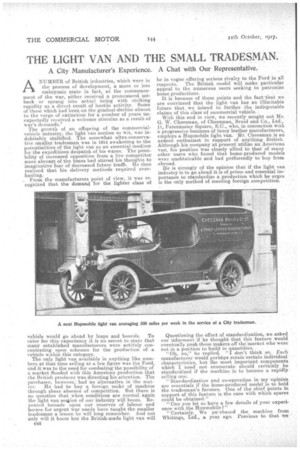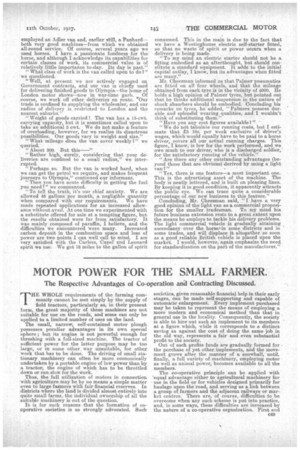THE LIGHT VAN AND THE SMALL TRADESMAN.
Page 12

Page 13

If you've noticed an error in this article please click here to report it so we can fix it.
A City Manufacturer's Experience. A Chat with Our Representative.
ANUMBER of British industries, which were in the process of development, a more or less embryonic state in fact, at the commencement of the war, either received a pronounced setbackor sprang into actual being with striking rapidity as a direct result of hostile activity. . Some of those which had been on the gradual decline almost to the verge of extinction fora number of years unexpectedly received a welcome stimulus as a result of
war's demands.* .
The growth of an offspring of the commercialvehicle industry, the light van section to wit, was indubitably stultified. The somewhat ultra-conservative smaller tradesman was in 1914 awakening to the potentialities of the light van as an essential medium for the expeditious despatch of his wares. The possibility of increased opposition from a live competitor more abreast of the times had stirred his thoughts to imaginative fear of decreased future trade. He then realized that his delivery methods required overhauling.• -_. From the manufacturers point of view, it was recognized that the demand for the lighter class of vehicle would go ahead by leaps and bounds. To cater for this expectancy it is no secret to state that many established manufacturers were actively concentrating upon schemes for the production of a vehicle 'within this category.
The only light van available in anything like numbers at that time selling at a low figure was the Ford, th'icl it was to the need for combating the possibility of a market flooded with this American production that the British producer was directing his attention. The purchaser, however,had no alternative in the matter. He had to buy a foreign make of machine through sheer absence of competition. But there is no question that when conditions are normal, again the light van seoition of our industry will boom. Repeated inroads upon our reserves of labour and horses for urgent war needs have taught the smaller tradesman a lesson he will long remember. And not only will it boom but the British-made light van will
046
be in vogue offering serious rivalry to the Ford in all respects. The British model will make particular appeal to the numerous users seeking to patronize homeproductions. •
It is because of these points and the fact that we are convinced that the light van has an illimitable future that we intend to further the indisputable claims of this class of commercial vehicle. _ With this end in view, we Tecently sought out Mr. G. W. Cheesman, of Cheesnian Braid and Co., Ltd., 11, Paternoster Square, E.C., Who, in connection with a progressive business of fancy leather manufacturers, employs a Hupmobile light van. Mr. Cheesman is an ardent enthusiast in support of anything British. Although his company at present utilize an .American van, his position was closely allied to that of many other users who found that home-produced models were unobtainable and had perforcedly to buy from abroad.
He is strongly of the opinion that if the light van industry is to go ahead it is of prime and essential importance to standardize a production which he urges is the only method of meeting foreign competition.
,Questioning the effect of standardization, we asked our informant if he thought that this feature would eventually push those makers off the'market who were not in a position to build in quantities. "Oh, no,'' he replied. "I don't think so. Each manufacturer would perhaps retain certain individual characteristics, but the most important components which I need not enumerate should certainly be standardized if the machine is to become a rapidly selling one. "Standardization and co-operation in my opinion are essentials if the home-produced model is to hold the tradesman's favours. One of the chief points in support of this feature is the ease with which spares could be obtained." " Can you let us have a few details of your experience with the Hunmobile " " Certainly, We pit-chased the machine from Whitings, Ltd., a year ago. Previous to that we
employed an Adler van and, earlier still, a Panhardboth very good machines—from which we obtained all-round service. Of course, several years ago we used horses. I have a passionate fondness for the horse., and although I acknowledge its capabilities for certain classes of work, its commercial value is of relatively little importance to-day. Its day is past."
" What class of work is the van called upon to do?" we questioned. • " Well, at present we are actively engaged on Government contracts, and our van is chiefly used for delivering finished goods to Olympia—the home of London motor shows—now in war-time garb. Of course, we work off other deliveries en route. 'Our trade is confined to supplying tire wholesaler, and our radius of delivery is restricted to London and the nearest suburbs."
"Weight of goods carried.? The van has a 15-cwt. carrying capacity, but it is sometimes called upon to take an additional 5 cwt. We do not make a feature of overloading, however, for we realize its disastrous possibilities. Our goods vary in weight and size."
"What mileage cities the van cover weekly ? " we queried.
"About 300. But this—" "Rather high, surely, considering that your deliveries are confined to a small radius," we interrupted.
"Perhaps so. But the van is worked bard, when we can get the petrol we require, and makes frequent journeys to Olympia," continued our informant.
"Then you have acute difficulty in getting the fuel you need?" we commented.
"To tell the truth, it's our chief anxiety. We are allowed 48 gallons per month, a negligible quantity when compared with our requirements. We have made repeated applications for an increased allowance without avail. At one time we experimented with a substitute offered for sale at a tempting figure, but the results obtained were far from satisfactory. It was mainly composed of paraffin, I believe, and the difficulties we encountered 'were many. Increased carbon deposit in the combustion space and loss of power are two points I can well call to mind. I am very satisfied with the Carless, Capel and Leonard spirit we use. We get 18 miles to the gallon of spirit
consumed. This in the main is due to the fact that we have a Westinghouse electric self-starter fitted, so that no waste of spirit or power occurs when. a delivery is being made. "To my mind an electric starter should not be a fitting embodied as an afterthought, but should constitute a standard equipment. It adds to the initial. Capital outlay, I know, but its advantages when fitted are many."
Mr. Cheesman informed us that Palmer pneumatics are fitted on all four wheels, and that the mileage obtained from each tyre is in the vicinity of 4000. He holds a high opinion of Palmer tyres, but pointed out that he thinks additional suspension in the nature of shock absorbers should be embodied. Concluding his remarks on tyres, he added, " PaImers possess durable and splendid wearing qualities, and I wouldn't think of substituting them.'
"Have you any cost figures available?" "We do mit tabulate our running costs, but T estimate that £3 10s. per week exclusive of driver',s wages, which would equally have to be paid to a horse driver, covers all our actual running charges. This figure, I know, is low for the work performed, and we owe much to our driver, who is a, discharged soldier, for the satisfactory running of the vehicle. '
"Are there any other outstanding advantages (beyond those that are obvious) derived by using a light van ? "
"Yes„ there is one feature—a most important one. This is the advertising asset of the machine. The body is neatly lettered, and is built on pleasing lines. By keeping it in good condition, it apparently attracts the public eye. We can trace quite a considerable percentage of our new business to this feature." Concluding, Mr. Cheesman said, " I have a very good opinion of the light van as a commercial proposition for the smaller tradesman. To my mind his future business extension rests to a great extent upon the means he employs to tackle his delivery problems. The light commercial vehicle is gradually attaining ascendancy over the horsetin some districts and in some trades, and will displace it altogether so soon as a good reliable British vehicle is placed upon the market. I would, however, again emphasize the need for standardization on the part of the manufacturer."






















